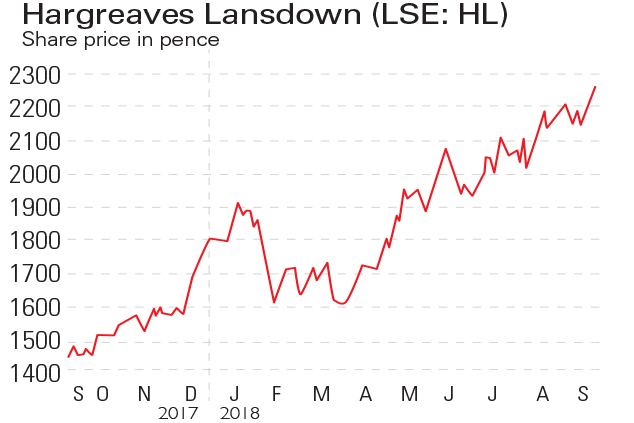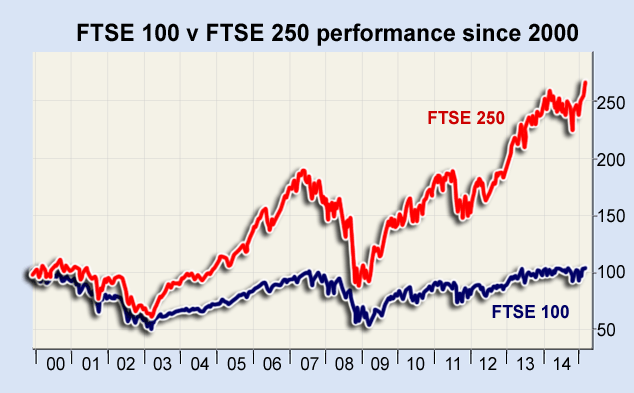‘Don’t buy our sector’ says Aberdeen boss – but he’s wrong
The chief executive of Aberdeen Asset Management believes fund managers’ share prices are too high. But there are some good stocks in the sector, says Ed Bowsher.

Get the latest financial news, insights and expert analysis from our award-winning MoneyWeek team, to help you understand what really matters when it comes to your finances.
You are now subscribed
Your newsletter sign-up was successful
Want to add more newsletters?

You don't often hear a chief executive say that analysts are too bullish on his company's prospects.
So my interest was piqued when I saw the boss of Aberdeen Asset Management (LSE: ADN), Martin Gilbert, do just that on Friday.
Gilbert reckons that the City's hopes for Aberdeen and the rest of the asset management industry are simply out of step with reality.
Try 6 free issues of MoneyWeek today
Get unparalleled financial insight, analysis and expert opinion you can profit from.

Sign up to Money Morning
Don't miss the latest investment and personal finances news, market analysis, plus money-saving tips with our free twice-daily newsletter
Don't miss the latest investment and personal finances news, market analysis, plus money-saving tips with our free twice-daily newsletter
In effect, he's saying that share prices in the sector are too high.
It's a refreshingly honest take. But in this case, I think he's wrong. There are some good opportunities in this sector you just need to know where to look.
Money managers have over-promised and under-delivered
"We have got into a situation where the industry has over-promised and under-delivered Analysts have been a bit too bullish on the sector. At one stage, we [at Aberdeen] had 19 buy ratings and three holds you can only go one way from there."
Gilbert's view is sensible, no doubt about it. We're five years into a bull market. It's not the longest ever, but it's beyond the average bull market length. So it would be no great surprise if the stock market fell significantly at some point over the next couple of years.
If that happened, the value of the assets that Aberdeen manages in various funds would fall. And as a result, Aberdeen's fee income and therefore its profits would fall too.
Aberdeen has also been hit by the poor performance of emerging markets over the last year. Emerging-market funds are the core of Aberdeen's business, so the company inevitably suffers when sentiment turns against the likes of China and India.
Indeed, Aberdeen lost a mandate to look after assets worth £4bn for a group of Asian investors earlier this year. The strength of the pound has also hurt the company.
What's more, some of the long-term trends for the fund management sector are also negative. Thanks to regulatory changes, fund investors are now better informed about where their money is going. No longer do investors just pay one annual charge for a fund investment. Instead, they pay separate fees to the fund manager and the platform provider, such as Hargreaves Lansdown (LSE: HL).
This greater level of transparency is pressing Aberdeen and its peers to cut charges. And increased competition could drive charges down further. As Gilbert put it: "The fund management-sector has been very easy It's a high margin business. It does tend to bring in the competition."
On top of that, more and more investors are waking up to the advantages of passive funds over the more expensive actively-managed funds. (A passive fund just tracks a particular stock market index and normally buys all the shares in that index. Active funds employ expensive fund managers to pick their favourite shares, in the hope of beating the market.)
Many large fund management companies don't offer any passive funds. Even where they do, they're inevitably less profitable, given the lower charges that come with them.
It's not all bad news there are a few good stocks in this sector
Henderson Group (LSE: HGG)
But there are some reasons to be positive about other firms in the sector.
For starters, I think there's a growing awareness that we all need to save harder. A big chunk of those savings will go into the stock market via investment funds. The new £15,000 annual limit for Individual Savings Account (Isa) investing should also help.
I also think that, despite all the bad news, the valuations for some fund management groups have probably fallen too far. Perhaps surprisingly, Aberdeen is one of the best examples. The share price is down 15% this year, and the price/earnings ratiois now just 13 as a result. That's not too bad at all.
What's more, Aberdeen bought Scottish Widows Investment Partnership (SWIP) earlier this year. SWIP has a decent passive business, so Aberdeen is now a more diversified business and less reliant on emerging markets.
But fund management companies aren't the only way to play the likely long-term trend of increased stock market investment by private individuals. You can also invest in the investment platforms that enable you to buy shares and funds cheaply over the web.
The best known is Hargreaves Lansdown, and it's been fabulously successful in recent years. However, I'm not tempted to buy, because it just looks too expensive, and greater competition may force Hargreaves to cut its prices (and margins), before too long.
However, one other stock has caught my eye in this area. It's Charles Stanley (LSE: CAY). Historically, the company is a traditional stockbroker. But it's now sensibly moving to where the growth is, and has launched Charles Stanley Direct, a rival to Hargreaves Lansdown. This new(ish) platform looks good, and I suspect Charles Stanley can be a successful player here. The rest of Charles Stanley's business seems to be doing reasonably well, so at 343p, the company does look tempting.
So, overall, I think that Gilbert was a little harsh on his sector perhaps reflecting the drop in his company's share price in the past year. Sure, there are no screaming bargains here, and there are issues to worry about, but both Aberdeen and Charles Stanley should prove to be decent investments in the long run.
Our recommended articles for today
The market's got it wrong on this niche miner
The gold market just got very interesting
On this day in history
11 August 1942: Screen goddess Hedy Lamarr invents Wi-Fi
Get the latest financial news, insights and expert analysis from our award-winning MoneyWeek team, to help you understand what really matters when it comes to your finances.
Ed has been a private investor since the mid-90s and has worked as a financial journalist since 2000. He's been employed by several investment websites including Citywire, breakingviews and The Motley Fool, where he was UK editor.
Ed mainly invests in technology shares, pharmaceuticals and smaller companies. He's also a big fan of investment trusts.
Away from work, Ed is a keen theatre goer and loves all things Canadian.
Follow Ed on Twitter
-
 Financial education: how to teach children about money
Financial education: how to teach children about moneyFinancial education was added to the national curriculum more than a decade ago, but it doesn’t seem to have done much good. It’s time to take back control
-
 Investing in Taiwan: profit from the rise of Asia’s Silicon Valley
Investing in Taiwan: profit from the rise of Asia’s Silicon ValleyTaiwan has become a technology manufacturing powerhouse. Smart investors should buy in now, says Matthew Partridge
-
 Hargreaves Lansdown takeover: what it means for your money
Hargreaves Lansdown takeover: what it means for your moneyBritain’s biggest investment platform has agreed a £5.4 billion takeover. What does it mean for shareholders and customers?
-
 Neil Woodford, fund managers, and the systemic risk to the financial system
Neil Woodford, fund managers, and the systemic risk to the financial systemFeatures The consequences from the Neil Woodford debacle aren't limited to his fund's investors. He and his ilk could pose a systemic risk to the financial system, says Merryn Somerset Webb.
-
 After the Woodford fallout, is it time to buy Hargreaves Lansdown and Patient Capital?
After the Woodford fallout, is it time to buy Hargreaves Lansdown and Patient Capital?Features Two of the biggest casualties from Neil Woodford’s fall from grace are his investment trust - Woodford Patient Capital - and broker Hargreaves Lansdown. John Stepek looks at whether you should snap them up or leave them well alone.
-
 What Neil Woodford’s woes mean for your money
What Neil Woodford’s woes mean for your moneyFeatures With the suspension of dealing in Neil Woodford's Equity Income fund, John Stepek looks at where it all went wrong for the “star” fund manager, and what it means for you.
-
 If you'd invested in: Hargreaves Lansdown and Alfa Financial Software
If you'd invested in: Hargreaves Lansdown and Alfa Financial SoftwareFeatures Hargreaves Lansdown, the UK’s biggest investment platform, has seen profits rise, while Alfa Financial Software has suffered two profit warnings and share-price slump.
-
 Investment platforms are great, but they need to up their game
Investment platforms are great, but they need to up their gameFeatures Investment platforms have opened up investing for many people. But their pricing structures are obscure and switching between them is expensive and slow.
-
 FTSE 100 v FTSE 250: why have they diverged by so much?
FTSE 100 v FTSE 250: why have they diverged by so much?Features Kam Patel examines the reasons behind the heavy parting of ways between the FTSE 100 and the FTSE 250, and asks where they might be heading next.
-
Hargreaves Lansdown share price jumps as annuity companies slide
Features The Budget announcement on annuities has triggered some major share price carnage. Ed Bowsher looks at the winners and losers.
